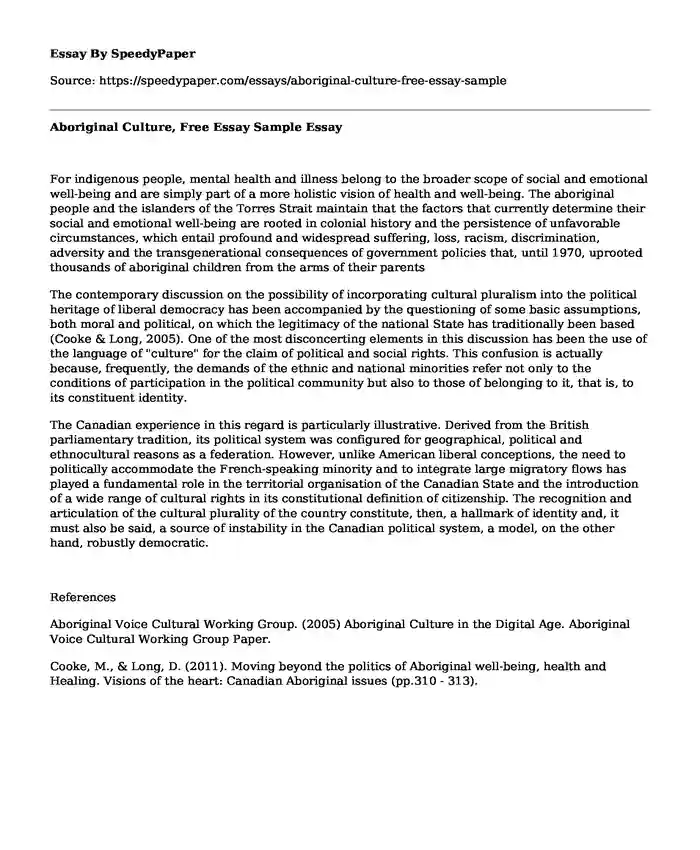
| Type of paper: | Research paper |
| Categories: | Culture Healthcare policy |
| Pages: | 2 |
| Wordcount: | 365 words |
For indigenous people, mental health and illness belong to the broader scope of social and emotional well-being and are simply part of a more holistic vision of health and well-being. The aboriginal people and the islanders of the Torres Strait maintain that the factors that currently determine their social and emotional well-being are rooted in colonial history and the persistence of unfavorable circumstances, which entail profound and widespread suffering, loss, racism, discrimination, adversity and the transgenerational consequences of government policies that, until 1970, uprooted thousands of aboriginal children from the arms of their parents
The contemporary discussion on the possibility of incorporating cultural pluralism into the political heritage of liberal democracy has been accompanied by the questioning of some basic assumptions, both moral and political, on which the legitimacy of the national State has traditionally been based (Cooke & Long, 2005). One of the most disconcerting elements in this discussion has been the use of the language of "culture" for the claim of political and social rights. This confusion is actually because, frequently, the demands of the ethnic and national minorities refer not only to the conditions of participation in the political community but also to those of belonging to it, that is, to its constituent identity.
The Canadian experience in this regard is particularly illustrative. Derived from the British parliamentary tradition, its political system was configured for geographical, political and ethnocultural reasons as a federation. However, unlike American liberal conceptions, the need to politically accommodate the French-speaking minority and to integrate large migratory flows has played a fundamental role in the territorial organisation of the Canadian State and the introduction of a wide range of cultural rights in its constitutional definition of citizenship. The recognition and articulation of the cultural plurality of the country constitute, then, a hallmark of identity and, it must also be said, a source of instability in the Canadian political system, a model, on the other hand, robustly democratic.
References
Aboriginal Voice Cultural Working Group. (2005) Aboriginal Culture in the Digital Age. Aboriginal Voice Cultural Working Group Paper.
Cooke, M., & Long, D. (2011). Moving beyond the politics of Aboriginal well-being, health and Healing. Visions of the heart: Canadian Aboriginal issues (pp.310 - 313).
Cite this page
Aboriginal Culture, Free Essay Sample. (2022, Apr 26). Retrieved from https://speedypaper.com/essays/aboriginal-culture-free-essay-sample
Request Removal
If you are the original author of this essay and no longer wish to have it published on the SpeedyPaper website, please click below to request its removal:
- Free Essay on EasyJet and Ryanair Profitability
- Personal Statement for Masters of Arts Program, Essay Example
- Management Skills in Students - Essay Samples
- Free Essay with the Summary of Terry Tempest Williams - Refuge
- Free Essay: The Curbing of Terrorism
- Free Essay. The Book Review on David Farber's Taken Hostage
- Free Essay Sample on Strategy and Partnering
Popular categories




